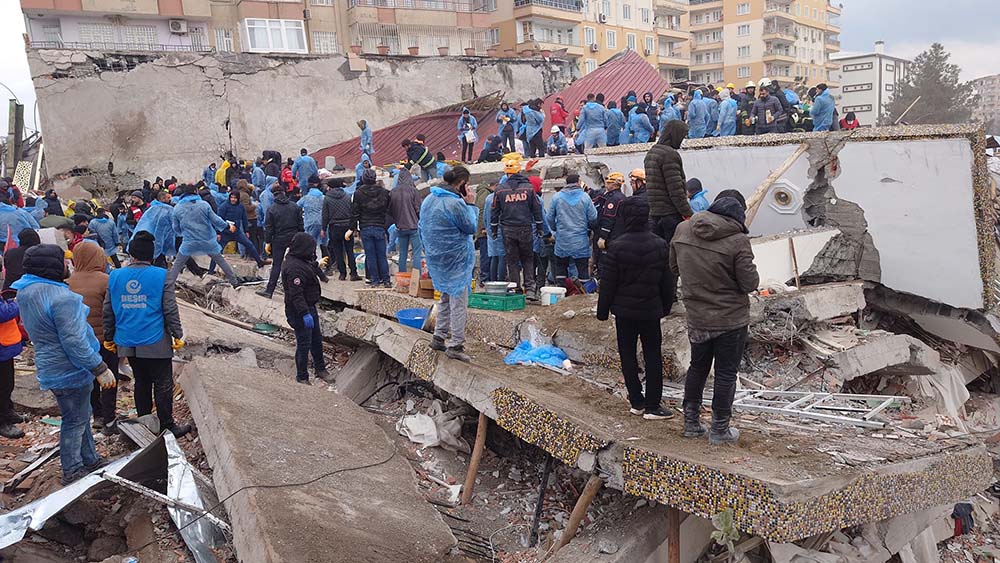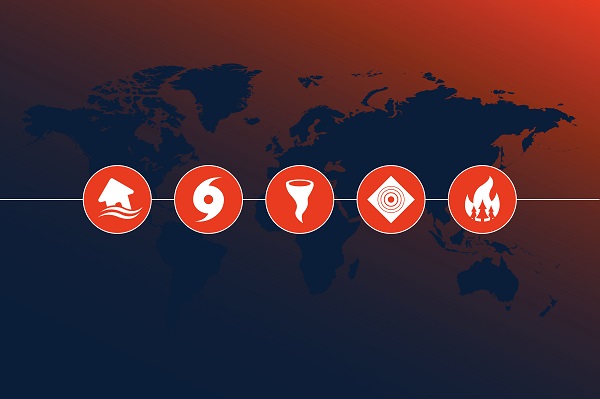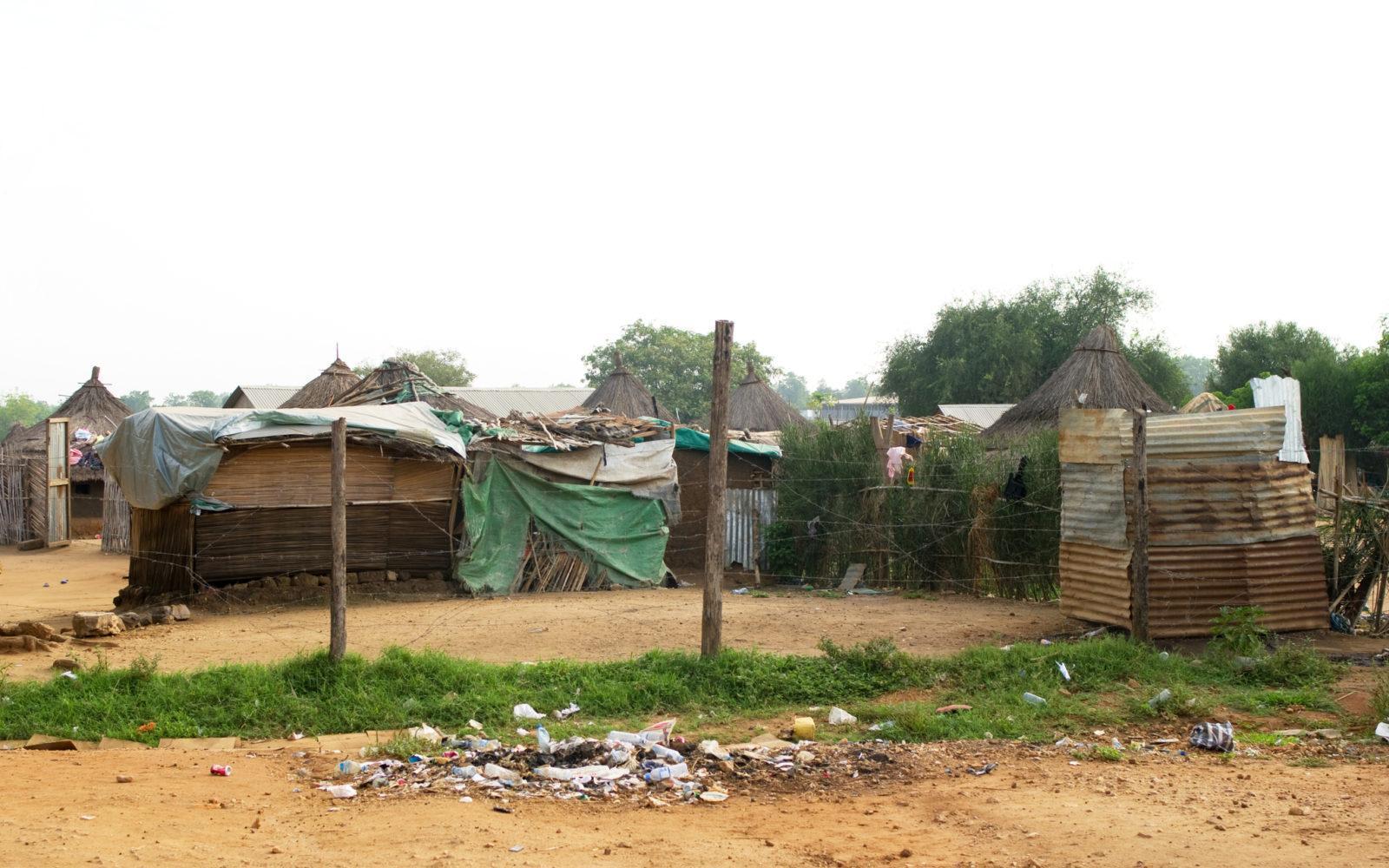Trauma and Resilience in Disaster’s Wake: A Scientific Perspective

Image above: The wreckage of a collapsed building, Diyarbakır, Turkey, 2023. VOA, Public domain, via Wikimedia Commons.
Science for Society is an APS webinar series focused on educating the public and bringing psychological science to decision-makers working to solve real world problems. In addition to psychological scientists, participants include public policy decision-makers, news reporters, advocates, and scholars from adjacent fields.
With a long history of traumatic events, Ukraine was already rife with psychological distress when Russia invaded it in February 2022. The World Bank in 2019 reported the country’s suicide rate as double that of the European Union. A sizeable number of Ukrainians displaced by internal fighting and the 2014 Russian annexation of Crimea suffered post-traumatic stress disorder (PTSD), depression, and anxiety (Shevlin et al., 2018; Roberts et al. 2019).
The war with Russia has dramatically deepened that anguish, and social psychologist Robin Goodwin (University of Warwick) is among the scientists examining the conflict’s impact on Ukrainians’ mental health.
Goodwin shared the findings on Ukrainians’ resilience in a presentation for “Aftermath of a Disaster: Psychological Well-being After Traumatic Events,” part of APS’ Science for Society webinar series. Six weeks after Russia’s invasion, Goodwin and colleagues examined survey data from a representative sample of 2,000 Ukrainians. Using data collected by colleagues in Israel, the researchers examined individuals’ perceptions of their own trauma and resilience. They controlled for demographic factors.
A recording of the webinar is available below for registrants and APS members.
The full webinar is available to APS members and registered workshop attendees.
The researchers linked high levels of resilience to factors such as trust in others, youth, being a Ukranian speaker, and a perceived ability to bounce back after hardship (Goodwin et al., 2023). Further analysis showed PTSD symptoms to be highest among Ukrainians who were displaced, either within or outside of the country. Goodwin and colleagues also found PTSD to be prevalent among people with disabilities, particularly those with impaired social functioning (Ben-Ezra et al., 2022; Kang et al., 2023).
In another study not yet published, Goodwin teamed with other scientists to examine data collected from 10,000 displaced Ukrainians and found the vast majority scored high on anxiety measures.
Goodwin and other speakers in the webinar described evidence-based steps that mental health professionals and communities can take to help people traumatized by natural and human-made disasters.
Public health expert Nikunj Makwana (Jawaharlal Nehru University) described a holistic ‘preventive medicine’ approach to disaster relief that includes preparing for immediate response to victims’ mental health needs and sustained measures to help them recover. He cited research showing cognitive-behavioral therapy (CBT) as an effective early intervention against PTSD and other psychological problems (Litz & Maguen 2007; Roberts et al., 2009).
Related content we think you’ll be interested in
-

Collective Trauma and Stress Following Disasters: APS Journal Articles Publicly Available
APS has updated its publicly available collection of journal research pertaining to trauma and disasters. [updated February 14, 2023] Visit Page
-

Collected Research on War, Conflict, and Authoritarianism
Research on war, conflict, and authoritarianism published in various APS journals between 2008 and 2020. Visit Page
-

Trauma and Ukraine: The World Health Organization Leveraged Psychological Science to Help Prepare Us for This Moment
Addressing a crisis like this means looking directly at the problem-solving needs that arise in times of war, danger, or difficulty and empowering ourselves to meet these needs. Visit Page
Yanki Yazgan, a child and adolescent psychiatrist in Turkey, described research involving victims of massive earthquakes that beset regions of that country in 1999 and 2023. After the most recent earthquake, findings from the 1999 disaster helped researchers identify critical factors that affect mental health (e.g., hunger, lack of sleep) and quickly create interventions that prioritized victims’ access to shelter, food, and other basic needs, Yazgan said.
In a longitudinal study after the 1999 quake, Yazgan and his colleagues trained teachers in psychoeducational and CBT techniques to help school children affected by the disaster. Over 3 years, children who received the intervention showed fewer symptoms of trauma, grief, and dissociation, as well as better academic performance and behavior, than those in a control group. (Wolmer et al., 2003, 2005).
In the wake of the 2023 earthquake, many schools remained closed for extended periods. So Yazgan and his colleagues provided teachers, parents, and mental health care professionals with a digital form of the intervention.
Feedback on this article? Email apsobserver@psychologicalscience.org or login to comment. Interested in writing for us? Read our contributor guidelines.
Ben-Ezra, M., Goodwin, R., Leshem, E., & Hamama-Raz, Y. (2022). PTSD symptoms among civilians being displaced inside and outside the Ukraine during the 2022 Russian invasion. Psychiatry, 320, 115011. https://doi.org/10.1016/j.psychres.2022.115011
Goodwin, R., Hamama-Raz, Y., Leshem, E., & Ben-Ezra, M. (2023). National resilience in Ukraine following the 2022 Russian invasion. International Journal of Disaster Risk Reduction, 85. https://doi.org/10.1016/j.ijdrr.2022.103487
Hamama-Raz, Y, Goodwin, R., Elazar, L., Ben- Ezra M. (2022). Can patriotism be a protective factor for symptoms of Post-Traumatic Stress Disorder? The case of the Russia–Ukraine 2022 War. Journal of Psychiatric Research, 155, 100–103. https://doi.org/10.1016/j.jpsychires.2022.08.016
Kang, I., Goodwin, R., Hamama-Raz, Y., Leshem, E., & Ben-Ezra, M (2023). Disability and post-traumatic stress symptoms in the Ukrainian general population during the 2022 Russian invasion. Epidemiology and Psychiatric Sciences, 32, e21, doi: 10.1017/S204579602300015X
Levin, Y., Ben-Ezra, M., Hamama-Raz, Y., Maercker, A., Goodwin, R., Leshem, E., & Bachem, R. (2023). The Ukraine–Russia war: A symptoms network of complex posttraumatic stress disorder during continuous traumatic stress. Psychological Trauma: Theory, Research, Practice, and Policy. https://doi.org/10.1037/tra0001522
Litz, B. T., & Maguen, S. (2007). Early intervention for trauma. In M. J. Friedman, T. M. Keane, & P. A. Resick (Eds.), Handbook of PTSD: Science and practice (pp. 306–329). The Guilford Press.
Roberts, N. P., Kitchiner, N. J., Kenardy, J., & Bisson, J. I. (2009). Systematic review and meta-analysis of multiple-session early interventions following traumatic events. The American Journal of Psychiatry, 166(3), 293–301. https://doi.org/10.1176/appi.ajp.2008.08040590
Roberts, B., Makhashvili, N., Javakhishvili, J., Karachesvskyy, A., Kharchenko, N., Shpiker, M., & Richardson, E. (2019). Mental health care utilisation among internally displaced person in Ukraine: Results from a nation-wide survey. Epidemiology and Psychiatric Sciences, 28(1), 100-111. doi:10.1017/S2045796017000385
Shevlin, M., Hyland, P, Vallières, F, Bisson, J, Makhashvili, N, Javakhishvili, J, Shpiker, M, Roberts, B. (2018). A comparison of DSM-5 and ICD-11 PTSD prevalence, comorbidity and disability: An analysis of the Ukrainian Internally Displaced Person’s Mental Health Survey. Acta Psychiatrica Scandinavica. https://doi.org/10.1111/acps.12840
Wolmer, L., Laor, N., Dedeoglu, C., Siev, J., Yazgan, Y. (2005). Teacher-mediated intervention after disaster: A controlled three-year follow-up of children’s functioning. Journal of Child Psychology and Psychiatry, 46, 1161-1168. https://doi.org/10.1111/j.1469-7610.2005.00416.x
Wolmer, L., Laor, N., Yazgan, Y. (2003). School reactivation programs after disaster: Could teachers serve as clinical mediators? Child and Adolescent Psychiatric Clinics, 12(2), 363–381. https://doi.org/10.1016/s1056-4993(02)00104-9





APS regularly opens certain online articles for discussion on our website. Effective February 2021, you must be a logged-in APS member to post comments. By posting a comment, you agree to our Community Guidelines and the display of your profile information, including your name and affiliation. Any opinions, findings, conclusions, or recommendations present in article comments are those of the writers and do not necessarily reflect the views of APS or the article’s author. For more information, please see our Community Guidelines.
Please login with your APS account to comment.